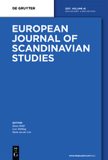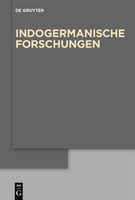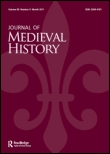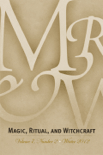
JOURNAL OF INDO-EUROPEAN STUDIES
Scope & Guideline
Exploring the Depths of Indo-European Heritage
Introduction
Aims and Scopes
- Linguistic Analysis and Etymology:
The journal publishes detailed studies on the etymology and phonology of Indo-European languages, exploring their historical development, connections, and unique features. - Cultural and Religious Studies:
Research often delves into the cultural practices, religious beliefs, and mythologies of Indo-European societies, providing insights into their worldviews and social structures. - Archaeological Perspectives:
The journal integrates archaeological findings with linguistic and cultural studies, examining how material evidence informs our understanding of Indo-European peoples and their migrations. - Comparative Studies:
Consistent comparative analyses of different Indo-European languages and cultures are a hallmark of the journal, showcasing similarities and divergences that illuminate broader historical narratives. - Historical Contextualization:
Papers frequently contextualize Indo-European studies within broader historical frameworks, addressing the implications of language and culture on societal development across time.
Trending and Emerging
- Interdisciplinary Approaches:
A growing trend in recent publications is the integration of linguistic, archaeological, and anthropological perspectives, indicating a shift towards more holistic studies that encompass multiple facets of Indo-European heritage. - Gender Studies in Indo-European Contexts:
There has been an increase in research focusing on gender roles and representations within Indo-European societies, revealing the complexities of social structures and cultural narratives. - Cognitive Linguistics and Semantics:
Emerging themes include cognitive linguistic approaches to understanding Indo-European languages, with a focus on semantics and the cognitive underpinnings of language and meaning. - Contemporary Relevance of Indo-European Studies:
Recent publications are increasingly addressing the relevance of Indo-European studies to contemporary issues, such as identity, nationalism, and cultural heritage, reflecting a broader societal engagement with historical narratives. - Environmental and Ecological Linguistics:
There is a budding interest in exploring how Indo-European languages and cultures relate to environmental and ecological themes, which may inform discussions on sustainability and cultural adaptation.
Declining or Waning
- Focus on Early Indo-European Origins:
There has been a noticeable decrease in papers specifically dedicated to the earliest origins of Indo-European languages, possibly indicating a shift towards more contemporary linguistic studies or a saturation of existing research. - Phonological Studies of Lesser-Known Languages:
Research focusing on the phonology of less widely studied Indo-European languages has been declining, potentially due to a greater emphasis on more prominent languages such as Latin, Greek, and Sanskrit. - Mythological Comparisons:
Papers that engage in comparative mythology across Indo-European cultures have diminished, suggesting a possible waning interest in mythological frameworks or a move towards more empirical and less interpretative studies. - Traditional Indo-European Studies:
There appears to be a decline in traditional methodologies that focused heavily on philological approaches, as scholars increasingly adopt interdisciplinary methods that incorporate modern theoretical frameworks.
Similar Journals

BULLETIN OF THE INSTITUTE OF HISTORY AND PHILOLOGY ACADEMIA SINICA
Navigating the Complexities of Human Culture.BULLETIN OF THE INSTITUTE OF HISTORY AND PHILOLOGY ACADEMIA SINICA is a distinguished academic journal published by the Academia Sinica's Institute of History and Philology, based in Taiwan. Focused on the interdisciplinary fields of history, linguistics, archaeology, and religious studies, this journal provides a scholarly platform for researchers and professionals seeking to disseminate innovative findings and theoretical advancements. Despite its recent Q4 categorization in several areas including archaeology and linguistics, the journal is committed to fostering rigorous dialogue and enriching the academic community's understanding of historical and philological nuances. As an essential resource for those invested in the humanities, particularly within the context of Asian studies, it remains dedicated to enhancing visibility and accessibility to pivotal research. While currently not an open-access publication, it continues to shape the discourse within its field through concise contributions from credible scholars. Join the journal's ongoing mission to illuminate the complexities of history and language, bridging gaps across cultures and time.

Studi e Saggi Linguistici
Bridging Theory and Practice in Linguistic InquiryStudi e Saggi Linguistici is a distinguished academic journal published by EDIZIONI ETS, based in Pisa, Italy. With its ISSN 0085-6827, this journal has established itself as a vital resource in the field of linguistics, particularly noted for its contributions since its inception in 2016. Although currently categorized in the lower quartile (Q4) by the 2023 metrics in the domains of Linguistics and Language within Scopus, it remains a significant platform for innovative research and critical discussions surrounding language studies. Focusing on both theoretical and practical aspects of linguistics, the journal serves as a nexus for scholars and practitioners alike, facilitating a rich interchange of ideas and knowledge in a rapidly evolving discipline. As an invaluable publication for researchers, professionals, and students, Studi e Saggi Linguistici is committed to advancing the understanding of linguistic phenomena and fostering scholarly communication in its field.

European Journal of Scandinavian Studies
Advancing the frontiers of Scandinavian scholarship.European Journal of Scandinavian Studies is an esteemed journal published by Walter de Gruyter GmbH, dedicated to advancing scholarship in the fields of Cultural Studies, Linguistics and Language, and Literature and Literary Theory. Since its inception in 2010, the journal has been a pivotal platform for researchers and scholars, showcasing cutting-edge research and critical discussions pertaining to Scandinavian languages and cultures. With an ISSN of 2191-9399 and an E-ISSN of 2191-9402, the journal emphasizes accessibility to impactful academic work, despite its current non-open access model. While the journal is categorized within the Q4 quartile for Cultural Studies and Linguistics/Language, it has shown notable potential in ranking higher in its specialized domains, fostering a growing community of researchers invested in Scandinavian studies. The journal's office is located in Berlin, Germany, further enriching its European scholarly context. As it continues to evolve, the European Journal of Scandinavian Studies serves as a vital resource for academics seeking to engage deeply with the multifaceted aspects of Scandinavian culture and linguistics.

Acta Orientalia Academiae Scientiarum Hungaricae
Navigating the Rich Tapestry of Cultural HeritageActa Orientalia Academiae Scientiarum Hungaricae, published by AKADEMIAI KIADO ZRT, stands as a prominent peer-reviewed journal in the fields of Cultural Studies, History, and Literature. Since its inception in 2007 and continuing through 2024, the journal has established itself as an essential resource for scholars and practitioners, achieving Q1 rankings across multiple categories in 2023, highlighting its impact and relevance. With a strong presence in Scopus rankings, particularly in Literature and Literary Theory (Rank #269/1106, 75th Percentile) and History (Rank #738/1760, 58th Percentile), Acta Orientalia serves as a pivotal platform for innovative research that explores the intersections of culture, history, and literary theory. Currently, the journal offers traditional access options, maximizing its reach to a diverse readership. By publishing cutting-edge research, the journal contributes significantly to the academic discourse, fostering a deeper understanding of the complexities inherent in the human experience.

Zbornik Radova Vizantoloskog Instituta
Diving Deep into the Nuances of Byzantine LiteratureZbornik Radova Vizantoloskog Instituta is a distinguished open-access journal published by the Institute of Byzantine Studies, Serbian Academy of Sciences and Arts, located in Belgrade, Serbia. Since its inception in 2003, this journal has served as a vital platform for the dissemination of scholarly research in the fields of Classics, History, Linguistics and Language, and Literature and Literary Theory. Although it currently holds a Q4 ranking in the 2023 category quartiles, its commitment to fostering academic discourse and research accessibility is unwavering. The journal features a diverse range of articles that explore the complexities and nuances of Byzantine studies and related disciplines, catering to a broad audience of researchers, professionals, and students dedicated to the humanities. With a focus on both historical context and contemporary perspectives, Zbornik Radova Vizantoloskog Instituta aims to contribute significant insights into the academic community while promoting scholarly interaction on a global scale.

Revista Letras
Cultivating Knowledge in the Heart of BrazilRevista Letras (ISSN: 0100-0888, E-ISSN: 2236-0999) is a prominent academic journal published by Universidade Federal do Paraná, Editora, renowned for its commitment to advancing knowledge in the fields of literature, linguistics, and cultural studies. As a pivotal platform for scholarly exchange, the journal aims to foster rigorous research and interdisciplinary dialogue, addressing themes relevant to both Brazilian and global literature. With an emphasis on open access, Revista Letras ensures that its research is widely disseminated, enabling greater accessibility for researchers, professionals, and students alike. Located in Curitiba, Paraná, Brazil, the journal actively participates in the academic community, contributing to the ongoing conversation surrounding literary and linguistic studies. Its dedication to quality scholarship makes it an invaluable resource for anyone looking to deepen their understanding of these dynamic fields.

INDOGERMANISCHE FORSCHUNGEN
Illuminating the Path of Comparative LinguisticsINDOGERMANISCHE FORSCHUNGEN is a prominent academic journal, published by WALTER DE GRUYTER GMBH, focused on the field of linguistics and language studies. With an impressive history that dates back to 1892, this journal has been a vital resource for researchers and professionals exploring the intricacies of Indo-European languages. Although it does not offer open access, its comprehensive and rigorous articles—published in both print (ISSN: 0019-7262) and electronic formats (E-ISSN: 1613-0405)—are instrumental for anyone delving into historical linguistics and comparative studies. The journal currently holds a Q3 ranking in Linguistics and Language, indicating its significance within the academic community, as evidenced by its Scopus rankings in both the Arts and Humanities and Social Sciences domains. Spanning decades of scholarship, INDOGERMANISCHE FORSCHUNGEN plays a pivotal role in advancing the study of language and is essential for scholars aiming to contribute to the dialogue in this ever-evolving discipline.

JOURNAL OF MEDIEVAL HISTORY
Illuminating the Shadows of Medieval TimesJOURNAL OF MEDIEVAL HISTORY, published by Routledge Journals, Taylor & Francis Ltd, stands as a vital resource in the field of historical studies, focusing on the complex tapestry of the medieval period from 1975 to 2024. With an ISSN of 0304-4181 and E-ISSN of 1873-1279, this journal boasts an impressive Q2 categorization in History, ranking #502 out of 1760 in the Scopus Arts and Humanities rankings, placing it in the top 29% of its field. The journal aims to publish high-quality, innovative research that enhances the understanding of medieval history, making it an indispensable read for scholars, practitioners, and students alike. While it does not currently offer Open Access options, its reputable standing ensures that it reaches a wide audience dedicated to exploring the intricacies of the medieval era. Engage with cutting-edge scholarship and historical insights that collectively contribute to the advancement of medieval studies.

ZEITSCHRIFT DER DEUTSCHEN MORGENLANDISCHEN GESELLSCHAFT
Connecting Scholars Through the Lens of Cultural ExchangeZEITSCHRIFT DER DEUTSCHEN MORGENLANDISCHEN GESELLSCHAFT is a distinguished academic journal published by Harrassowitz Verlag, prominently situated in Germany. With ISSN 0341-0137, it serves as a critical forum for scholars engaged in the fields of Cultural Studies and History. The journal has carved out its niche in the academic community with its Q3 ranking in both disciplines as of 2023, reflecting its commitment to fostering in-depth research and discussions that illuminate various historical and cultural contexts. Despite its current positioning in the lower quartiles, the journal has a specific focus on the interaction between Eastern and Western cultures, thus appealing to researchers, professionals, and students alike who are keen on exploring new insights in a globalized world. While the journal is not open access, it remains an essential resource for those aiming to deepen their understanding of cultural interrelations and historical developments from a German perspective. For further inquiries, the journal can be contacted at its address: Kreuzberger Ring 7B-D, Wiesbaden 65174, Germany.

Magic Ritual and Witchcraft
Unveiling the Intersections of Culture and the SupernaturalMagic Ritual and Witchcraft, published by UNIV PENNSYLVANIA PRESS, is a pivotal journal in the fields of Cultural Studies, History, and Religious Studies, recognized for its scholarly contributions since its inception in 2014. With a strong focus on the interdisciplinary nature of magic and ritual practices across cultures, this journal provides a platform for original research, critical reviews, and theoretical discussions that illuminate the complexities of these phenomena. Operating from the heart of the United States, Magic Ritual and Witchcraft has attained a commendable standing within its category quartiles, ranked Q2 in 2023, indicating its significance and reach within the academic community. Despite not being an open-access journal, its articles are accessible through libraries and institutions, ensuring that this essential body of work reaches a diverse audience of researchers, professionals, and students passionate about the intersections of culture, history, and the sacred. As the dialogue around ritual practices continues to evolve, this journal remains an invaluable resource for advancing scholarship and fostering insights into the magical dimensions of human experience.